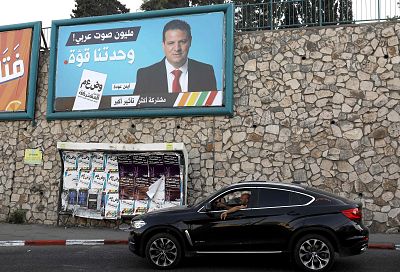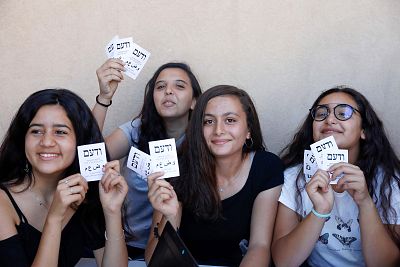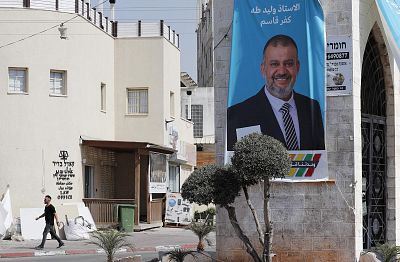After being vilified, "Arab voters didn't like that, and they decided to do something about it," one expert said.
TEL AVIV, Israel — If Prime Minister Benjamin Netanyahu'scampaign for re-election will be remembered for one thing, it will likely be the unabashed vilification of Israel's Arab citizens, who represent a fifth of the country's population.
He accused Arabs of stealing the inconclusive April vote. Five days before last week's election, his official Facebook page said that Arabs "want to annihilate us all — women, children and men," although the Likud Party later disowned the statement.
Yet, these efforts to suppress the Arab vote by a prime minister who is known as a political wizard appear to have backfired.
World
"The incitement against the Arabs was very strong provocation from Netanyahu," said Thabet Abu Rass, co-director of the Abraham Initiatives, a joint Arab-Jewish organization working toward equality in Israel.
"Arab voters didn't like that, and they decided to do something about it."
According to data from Arik Rudnitzky of the nonpartisan Israel Democracy Institute (IDI), Arab voter turnout jumped to 59 percent in last week's election, up from a record low of 49 percent in April.
The Joint List of Arab parties is expected to be the third-largest party in the Knesset, with 13 seats, up from 10. For the first time in Israeli history, an Arab Knesset member could become Israel's opposition leader, a post that comes with a security detail, briefings from the Mossad, meetings with all visiting international leaders, and rebuttals to the prime minister on the Knesset floor.
According to Abu Rass, Arab votes for the centrist Blue and White party gave Netanyahu's chief rival Benny Gantz an edge of two seats, depriving Netanyahu of the majority he needed to form a right-wing coalition government.
"Incitement has a price,"Joint List leader Ayman Odeh tweeted the morning after election day.
In an interview Wednesday with Israel's Channel 12, another Joint List member of the Knesset, Ahmad Tibi, credited Netanyahu's scare tactics with galvanizing Arab voters.
"Our campaign was asleep, weak, limping, just two weeks ago," he said.
"Then a week ago, someone, a magician, set off alarm clocks at the entrances to every Arab town. That was Benjamin Netanyahu. That was the cameras bill."
A spokesperson for Netanyahu's Likud Party declined to comment.
In the weeks before the election, Netanyahu unsuccessfully tried to pass last-minute legislation to place surveillance cameras in polling stations in Arab cities and towns. Spreading unfounded claims of rampant Arab voter fraud, he accused Arab parties of working to steal the election.
Echoing election day 2015, when Netanyahu warned his right-wing base that Arabs were going to the polls "in droves," this election day he posted almost hourly videos on Facebook calling on supporters to counter what he portrayed as dangerously high turnout among Arab voters.
In the middle of the day, his party told Israel's Channel 13 that it had installed facial recognition cameras outside Arab polling stations. Analysts concluded it was a false claim intended to intimidate Arab voters.
Those actions and statements, meant to simultaneously rile up Netanyahu's base and keep Arab voters home, seem to have had the opposite effect, both turning off more moderate right-wing Israeli voters and energizing Arab voters.
"Netanyahu's hate speech and discourse of fear, blaming the Arabs for stealing the election," Abu Rass says, "was the first and most important factor" behind the higher turnout among Arab voters this week.
"Netanyahu's goal was to try to prevent Arabs from reaching the ballots. But they came out in droves."
A high-ranking member of Netanyahu's Likud party admitted Wednesday that the party's pursuit of the so-called camera bill was a mistake.
"It didn't serve us, it hurt us," Miki Zohar, a Knesset member and close ally of Netanyahu, told Israel's Walla news website. "It woke up the Arab sector, which in turn came out to the polls, while also lulling right-wing voters into complacency."
Sally Abed, a Palestinian citizen of Israel and political activist with the organization Standing Together, cautioned that Arab voters do not feel victorious, and that the election outcome is still unclear.
Nevertheless, she said, "We are finally feeling like we can actually make a difference. After being delegitimized for so long, [Arab voters] were convinced their vote didn't make a difference. Now people realize their vote does really matter."
Abed hopes that Netanyahu and his Likud party have learned a lesson from this campaign.
"As a ruling party, you cannot just dismiss 20 percent of the population for that long," she said. "We are a crucial part of the political equation here in Israel and the fact that we have been removed from that equation for so long was only going to backfire."














